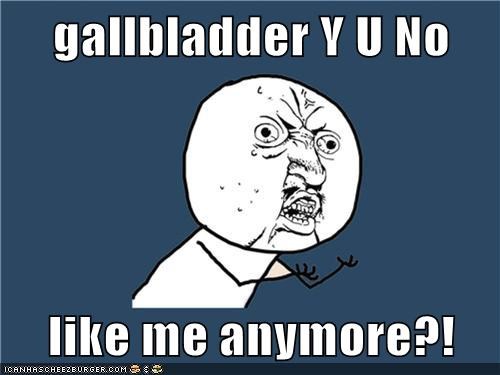In July 2013, I had my gallbladder removed. I had what one of my doctor’s called a dysfunctional gallbladder. Most people who have a cholecystectomy (surgical removal of the gallbladder) are suffering from gallstones. Gallstones can block the flow of bile from entering your stomach and can cause nausea, vomiting, pain, and other lovely digestive symptoms. But I didn’t have gallstones nor did I have the classic gallbladder problem systems. Basically, the only thing wrong was that I was nauseated everyday, sometimes all day, for nearly 18 months. I only went to the doctor when everyone was sick of me complaining and when I had lost so much weight that none of my clothes fit and my hip bones were bruised from rubbing against my pants.

It took a little while to figure out what the problem was, but after my HIDA scan, my dysfunctional gallbladder was revealed. A HIDA scan measures the rate bile leaves your gallbladder; that number is called an ejection factor. A normal ejection factor is somewhere between 30-60%. Mine was 19%. So, basically, my gallbladder was kaput and had to go. I had my gallbladder removed at the hospital where I work (after carefully choosing who could be in the room) and took about a week to recover.

At first, life without a gallbladder was grand. I wasn’t nauseated after every meal and I could finally do things like have a beer or eat an egg roll AND my sesame chicken without the fear of being miserable for the next 4 hours. It’s very important to eat small meals and limit your fat right after you’ve had your gallbladder removed. Not having a gallbladder means that bile is constantly released into your intestines instead of being stored in the gallbladder and released when needed, which means that the body can have trouble digesting fatty things. Eventually the body will learn to regulate itself and digestion begins to feel like normal.
Of course, being me, I couldn’t make anything simple, so my body had to have trouble learning to regulate how much bile to release and how to deal with the excess bile. After 5 months of increasing nausea and more weight loss, I went back to my gastroenterologist. After an endoscopy, he diagnosed me with postcholescystecomy syndrome, which is the either the continuation of symptoms after gallbladder removal or the development of new symptoms. Postcholescystecomy syndrome can either occur in the upper or lower GI tract. In my case, I had extra bile in my stomach causing reflux and the basically the same symptoms as before the surgery. My doctor prescribed me with a medicine that I had previous taken for one of my ulcers. It coats your stomach to prevent irritation.
Luckily, it worked. I now only occasionally have symptoms and when I do, I know exactly why. I need to stay away from spicy foods and anything extra fatty or greasy. I also have to avoid overeating. I can prevent these symptoms by taking the medicine but I prefer not to because I shouldn’t be overeating or eating super greasy foods anyway. Alcohol and dairy, once off limits, are now back on the menu (in moderation of course!). I’ve also found that I can eat citrus fruit, drink orange juice, and eat small amounts of red (but not green!) bell pepper without having any trouble.

It feels amazing not being sick all the time. I was so miserable that it often rubbed off on other people. I avoided going out to eat because I knew it would make me sick (if I wasn’t already) and I was a party pooper on several occasions because I couldn’t drink without getting very ill. I finally gained the weight back (of course now I have to worry about not gaining too much!) and my hair, once falling out in small clumps from malnutrition, is starting to grow back. I also feel like doing things again instead of curling up on the couch feeling sick and sorry for myself.
And I’m sure everyone really appreciates me not whining about my stomach all the time now. 🙂
















{ 2 comments… read them below or add one }
Bhuh, I feel your pain on this one Elizabeth. Same thing happened to me. Once it flared up, I would have to fast on <800 liquid calories a day for about five consecutive days. It would go away, but the worst part of it was not knowing what was causing it. I stumbled upon a food regiment that seems to keep it at bay, without having to be auto-draconian. It's a relief. And like you said, it's good to have a tangible reason to avoid over eating, and all the grease. Anyway, thanks for sharing your story and I'm glad you're feeling better.
I’m glad you found something to keep it at bay! Towards the end, even water was making me feel sick so surgery was necessary. I did try all sorts of diets and eliminations to see if I could control it. I think that’s an important first step.